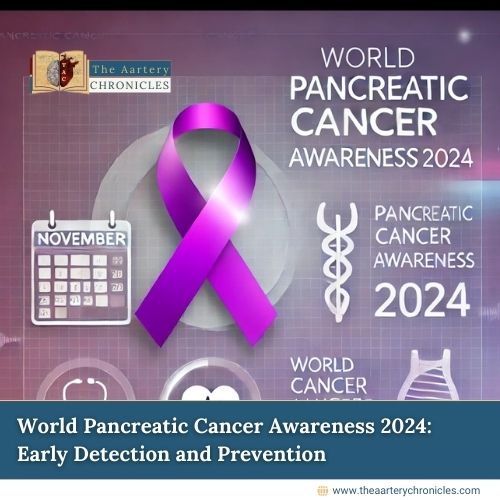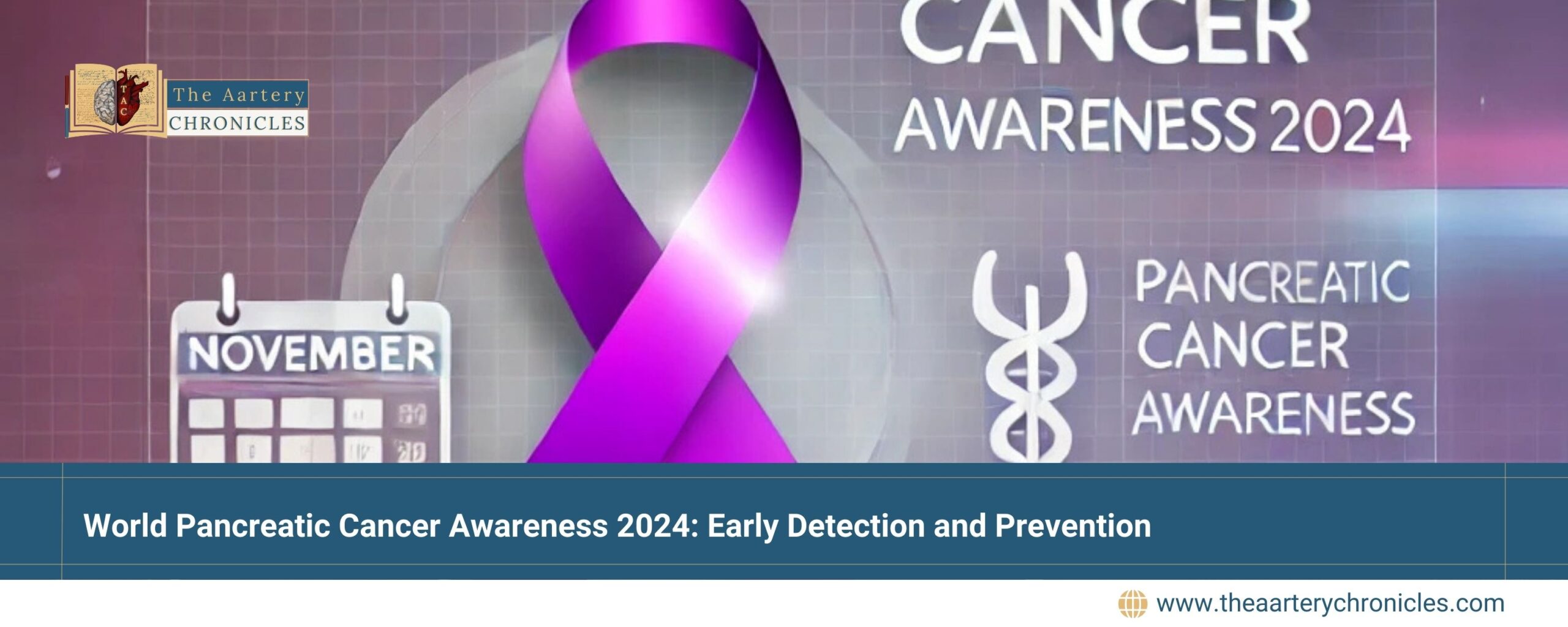

World Pancreatic Cancer Awareness 2024: A Call to Action for Early Detection and Prevention
November marks Pancreatic Cancer Awareness Month, a global healthcare initiative dedicated to spreading awareness about one of the deadliest cancers. Established in the early 2000s, this month-long campaign aims to educate people about the importance of early detection, treatment options, and preventive measures for pancreatic cancer. It serves as a beacon of hope for patients and their families, symbolized by the purple ribbon
This year, World Pancreatic Cancer Day falls on November 21, 2024, observed annually on the third Thursday of November. With the theme “A Day of Action, a World of Difference,” the campaign, focuses on ways to tackle this life-threatening disease such as
- Increased research
- Increased Funding
- Better Support
Why Pancreatic Cancer Awareness Matters
Pancreatic cancer is the 11th most common cancer worldwide and the 7th leading cause of cancer-related deaths. The disease disproportionately affects people in developed nations with higher Human Development Index scores. Its silent progression makes early diagnosis challenging, as symptoms typically appear in advanced stages when treatment becomes more difficult.
Raising awareness is extremely vital now. Many patients discover their condition too late, leading to limited treatment options and reduced chances of survival.
Did you know current survival rates are alarmingly low – ranging between 3% and 8% and have shown minimal improvement over the past five decades?
Can Pancreatic Cancer Be Detected Early?
Early detection of pancreatic cancer is notoriously difficult, as the disease often progresses silently without noticeable symptoms. However, advancements in medical research have introduced promising approaches for identifying the disease earlier in specific high-risk groups:
- High-Risk Group Monitoring: Certain Individuals are often monitored using advanced imaging techniques like endoscopic ultrasound (EUS) or MRI, such as
- Individuals with a strong family history of pancreatic cancer
- Genetic mutations (e.g., BRCA1/BRCA2)
- Chronic pancreatitis
- Blood-Based Biomarkers: Markers like CA 19-9, released by pancreatic cancer cells, and newer biomarkers such as KRAS mutations, are being studied for early-stage detection.
- Liquid Biopsies: These non-invasive tests analyze DNA, RNA, or proteins in the blood to detect potential cancerous changes early.
- Artificial Intelligence (AI): AI-powered imaging and data analysis tools are being developed to detect subtle changes indicative of early pancreatic cancer.
Despite these advancements, the lack of routine screening for the general population highlights the importance of recognizing symptoms and consulting a healthcare provider promptly.
"Early detection is the cornerstone of improving survival rates in pancreatic cancer. By focusing on awareness, regular screening for high-risk groups, and lifestyle modifications, we can make significant strides in combating this silent killer."
Dr Dipayan Nandy, Senior Oncosurgeon, Vadodara, Gujarat, India Tweet
The Impact of Pancreatic Cancer Awareness Campaigns
The Purple Ribbon movement has significantly contributed to spreading knowledge about pancreatic cancer symptoms and risk factors.
- Between 2011 and 2021, global awareness campaigns led to an increase in the five-year survival rate from 3% to 8%. However, challenges such as underfunding and the COVID-19 pandemic have caused setbacks, with survival rates dropping to 7.3% in 2022.
- Global efforts, including the Decade of Change, aim to raise survival rates to 13% by 2030 through continued research and awareness.
Preventive Tips to Lower Pancreatic Cancer Risk
While pancreatic cancer remains a daunting diagnosis, adopting healthy lifestyle choices can significantly reduce risk factors. Here are actionable tips to protect yourself:
1. Maintain a healthy weight – Obesity is a significant risk factor for pancreatic cancer.
2. Quit smoking – Tobacco use is linked to a higher likelihood of developing pancreatic tumours.
3. Limit alcohol consumption – Excessive drinking increases the risk of several cancers, including pancreatic cancer.
4. Avoid processed and red meats – These foods have been associated with an increased risk of cancer.
5. Eat a balanced diet – Incorporate more fruits, vegetables, and whole grains into your meals.
6. Reduce salt intake – Excessive sodium can harm overall health.
7. Stay vaccinated – Immunization against diseases that may contribute to carcinogenesis, like hepatitis, is essential.
Hope for the Future
Pancreatic Cancer Awareness Month serves as a powerful reminder that collective action can drive significant change. With ongoing efforts to fund research, educate the public, and support patients, the goal of improving survival rates is within reach.
By spreading awareness, supporting research, and encouraging preventive measures, we can make strides toward a brighter future. Let’s work together this November to make a world of difference in the fight against pancreatic cancer
- https://www.wcrf.org/preventing-cancer/cancer-statistics/pancreatic-cancer-statistics/
- American Cancer Society (ACS). What is Pancreatic Cancer? Available at: https://www.cancer.org
3. National Cancer Institute (NCI). Pancreatic Cancer Statistics. Available at: https://www.cancer.gov









